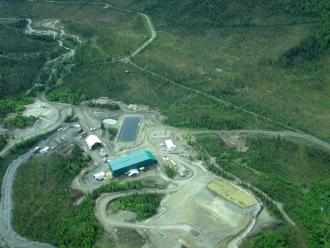
The Mobile Workers Guide – coping with FIFO and Rotational Shift Work in Mining. Yukon Experiences
In today´s mining industry men and women travel back and forth between their homes and the camps nearby their work places. This way of life is essential to the contemporary system of labour force provision in the extractive industries that has left the model of mono-industrial towns largely behind and has shifted to long-distance commuting (LDC) and fly-in/fly-out (FIFO) models. Understanding this way of life is relevant for both, the indigenous and non-indigenous people alike who are involved into this industry. Besides existing hardships such as separation from the family and the confinement to a life in the workers´ camp (under company control), the majority of people lead a meaningful life beyond stereotype assumptions of deviance such as drugs, prostitutes and alcohol.

Saxinger just completed the “Mobile Workers Guide – coping with FIFO and Rotational Shift Work in Mining. Yukon Experiences” as an applied research outcome. The booklet presents a wide range of insights into a work life that is characterised by mobility, living in camps and being on scheduled times away from home. In it, experienced workers – men and women alike – from a variety of professions in the exploration and mining sector provide insight for those who are new to this industry. They share stories, experiences, strategies for coping with potential difficulties and tips for how to benefit from this traveling lifestyle. The sections of the guide introduce the readers to topics, such as, coping with boom and bust cycles, specifics of mining communities, First Nation employment, women in mining, family life and private relationships, income management and career development.
This paper draws on examples from the Yukon gold and silver mining industry where local indigenous people as well as FIFO workers from all over Canada are employed. In particular experiences from community based research and collaboration with the First Nation of Na Cho Nyäk Dun in the Yukon Territory are discussed.

Dr Gertude Saxinger, Assistant Professor at the University of Vienna, Department for Social and Cultural Anthropology
Austrian Polar Research Institute
*Adjunct researcher at the Yukon College since 2015
*Vice general secretary of the Austrian Polar Research Institute
*Council member of the International Arctic Social Sciences Association (IASSA)
*Austrian representative at IASC International Arctic Science Committee
*Research projects in Siberia (on transporation infrastructure) and the Barents Region (on human security)
*Research themes: Arctic extractive industries: labour mobility (Fly-in/fly-out work), community-company relations, mono-industrial towns, regional development
*PI of the ReSDA project LACE: 2014 – 2017 (collaboration between Yukon College, Lakehead University, University of Vienna and the First Nation of Na Cho Nyäk Dun)
